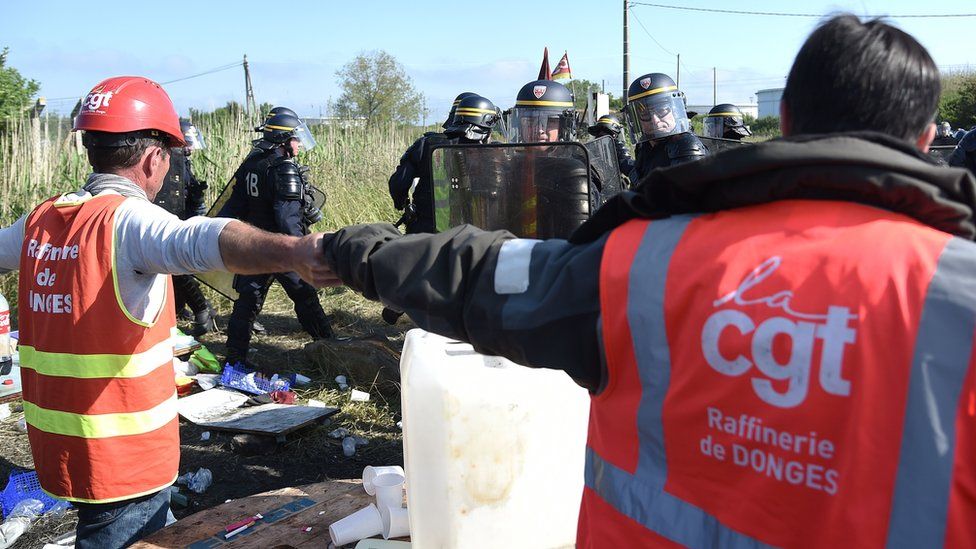France labour dispute: Hollande 'won't back down' over protests
- Published

French President Francois Hollande says he will not back down over labour reforms after unions threatened to escalate protests over the changes.
All but one of the union blockades at fuel depots have now been cleared, the authorities say. But shortages have caused long queues at petrol stations.
"I will stay the course because I think these are good reforms," Mr Hollande said.
However, Prime Minister Manuel Valls signalled they could be modified.
Thursday saw many protest rallies across the country, with 77 protesters arrested and 15 police officers injured in clashes, although the union demonstrations were mainly peaceful.
"Continue and step up the actions," eight unions said in a joint call after the day of action.
Newspapers have reappeared after the CGT union stopped the presses of all but the pro-communist L'Humanite yesterday, when they refused to run an opinion piece by CGT leader Philippe Martinez.
The BBC's Hugh Schofield in Paris says fuel supplies are now reaching petrol stations, but the unions are in no mood to ease off the protests.
One fuel depot at Gargenville in the Paris region remained out of action because workers there were on strike, the government said.
Protests in Paris turned violent as strikers picketed nuclear plants and ports elsewhere
The wave of opposition is a major challenge for the Socialist government, which does not want to alienate many of its natural voters.
Petrol shortages have been a particular problem in and around Paris and in southeastern France, TF1 said.
Speaking on the sidelines of the G7 summit in Japan, President Hollande said: "Our primary duty... is to do everything to maintain the supply of fuel to the public and to continue to provide essential public services".
The CGT union is leading the action, supported by other unions including Force Ouvriere and Unef, whereas the more moderate CFDT union backs the labour reforms.
One of the most controversial elements of the reform is Article Two, giving employers the right to negotiate changes to staff working time. Mr Valls said the article would not be amended.
Petrol panic buying: Impacts of French strike
Airport authorities say they have four to six days of fuel reserves left, but airlines have been asked not to fully refuel jets in France.
The request means a jet on a Paris-London return flight would refuel in London.
Fuel shortages have affected about 20% of France's petrol stations, TF1 said. Oil industry managers say they have deployed extra tanker crews, who will fill up in Belgium and Germany if necessary.
France is due to host the Euro 2016 football championships next month.
However, on 14 June, when French senators begin discussing the reform package, the unions plan to stage a "powerful national demonstration" in Paris.
They said some 300,000 people took part in protest marches on Thursday, whereas the authorities put the total at 153,000.
French labour reform bill - main points
- The 35-hour week remains in place, but as an average. Firms can negotiate with local trade unions on more or fewer hours from week to week, up to a maximum of 46 hours
- Firms are given greater freedom to reduce pay
- The law eases conditions for laying off workers, strongly regulated in France. It is hoped companies will take on more people if they know they can shed jobs in case of a downturn
- Employers given more leeway to negotiate holidays and special leave, such as maternity or for getting married. These are currently also heavily regulated
- Published26 May 2016
- Published26 May 2016
- Published25 May 2016
- Published23 May 2016
- Published15 March 2016